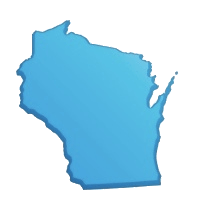Alternative Teaching Certification in Wisconsin

Wisconsin’s Mid-career Advancement Transition-to-Teaching project, WI-SMARTT, provides a number of options for professionals looking to switch careers and get into teaching. More information on all offered alternative programs may be found here.
Interested in learning about the traditional approach? Contact schools offering teaching certification programs in Wisconsin.
Alternative Certification Requirements
Education Requirements
All alternative licensure programs require applicants to hold a bachelor’s degree in a teaching content area, unless specifically noted. The lowest GPA required of any alternative certification program 2.5.
Alternative education program students pick subject areas to focus on during their education programs. Depending on the program they choose, different areas are available to the students.
Some subject areas offered include:
- Math
- Science
- Computer Science
- Special Education
- ESL
- Art
Students also decide which developmental level to concentrate while attending their programs. The developmental levels include:
- Early Childhood (Birth to Age 8)
- Early Childhood-Middle Childhood (Birth to Age 11)
- Middle Childhood-Early Adolscence (Ages 6 to 12 or 13)
- Early Adolescence-Adolescence (Ages 10 to 21)
- Early Childhood-Adolescence (All ages in Public Schools)
Examinations
Alternative teaching programs in Wisconsin require applicants pass PRAXIS I exams before enrolling. This shows that a candidate has the background knowledge necessary to effectively transition to a career in teaching.
The Praxis I exam is a pre-professional exam that tests alternative teacher education program applicants on their knowledge of reading, writing, and math.
During their alternative teaching education experience, students are also required to pass PRAXIS II subject examinations specifically tailored to their educational area. Each program establishes their own policies for when this exam is administered.
See the ETS website for more information and help preparing for the PRAXIS examinations.
Experience
Students of alternative teacher education programs are required to serve as student teachers in order to gain first-hand experience in the classroom. Depending on the program, student teaching may be offered as a paid or unpaid internship.
During their student teaching experiences, students are assigned a mentor who will help guide them and provide support in the classroom. Student teaching allows potential teachers to build a portfolio, showcasing their educational achievements.
Length of student teaching varies depending on the alternative teaching program a student enrolls in, but all offer great learning experiences for potential teachers. For more information on student teaching, click here.
Document and Application Requirements
After completion of your alternative teacher education program, you’re ready to begin the licensure application process.
An initial in-state teaching license requires applicants fill out form PI-1602-IS found on the Wisconsin Department of Public Instruction (DPI) website.
Applying for a license requires candidates complete an application packet that verifies your skills, background, and education. The packet consists of four main areas:
- Applicant Information
- Licenses Requested
- Post-Secondary Education and Institutional Endorsement
- Experience or Professional Growth Requirement
Applicants should completely fill out all requested information in the packet, and mail it, with their $100 application fee, to their certifying officer at their teacher education program. The certifying officer will confirm the information in the packet, and endorse you for licensure. Then, the officer will forward the packet with the application fee to the DPI.
Criminal History Background Check
In Wisconsin, teacher licensure applicants must undergo a background check, as well as complete a Conduct and Competency Review during the application process.
The Conduct and Competency Review consists of 12 questions designed to ensure a candidate can safely work with children.
Some of the questions include: “Have you ever been disciplined for alleged misconduct including, but not limited to, verbal, physical, or sexual abuse or harassment in the course of any employment?”
Responding with a “yes” answer to any of the questions requires the applicant to explain the situation fully, providing documentation of any offenses. The Conduct and Competency Review form should be completed and submitted with your license application.
Contact Information
More information about alternative teacher education programs may be found on the DPI website. You may also call the DPI toll free at (800) 266-1027.
The DPI office is located at:
DPI Educator LicensingDrawer 794
Milwaukee, WI 53293-0794










